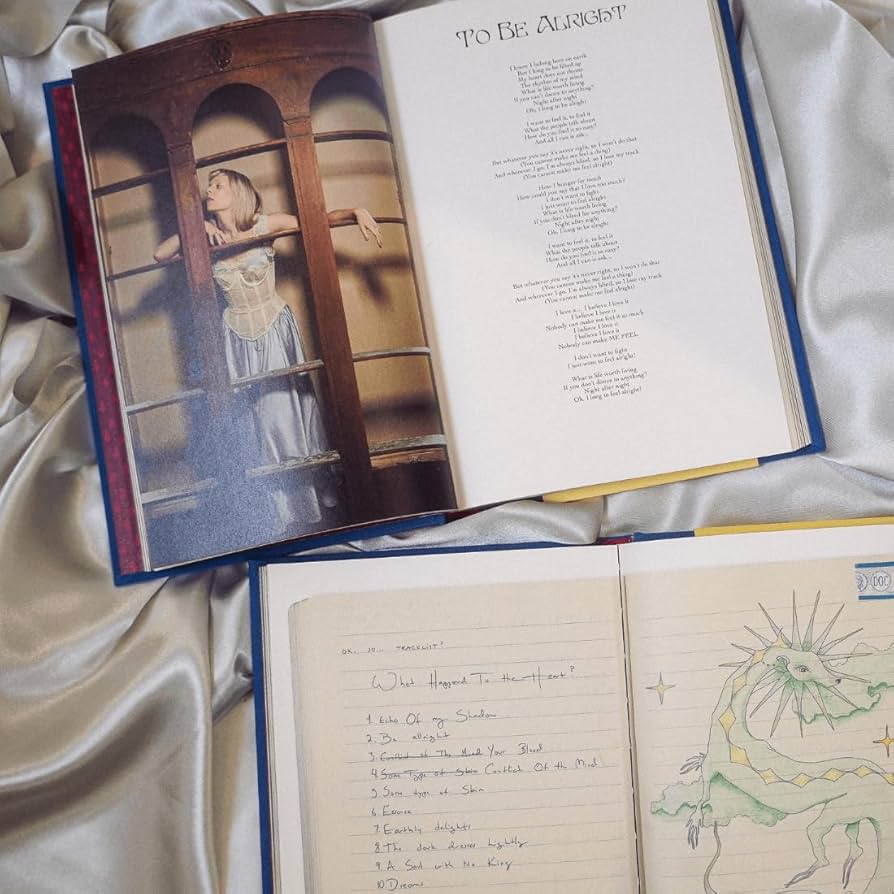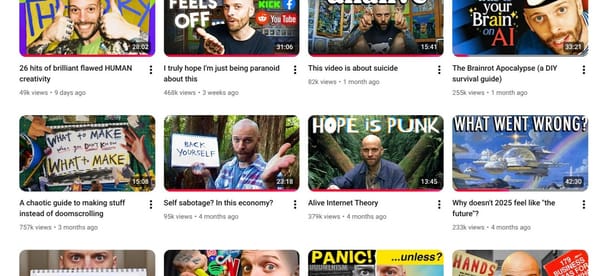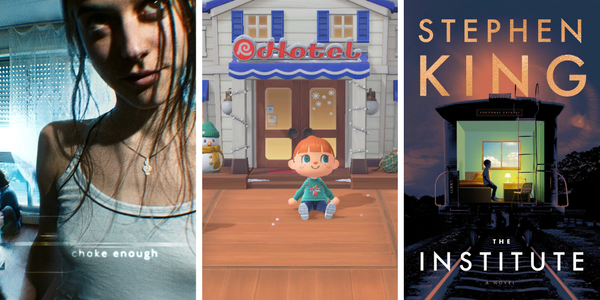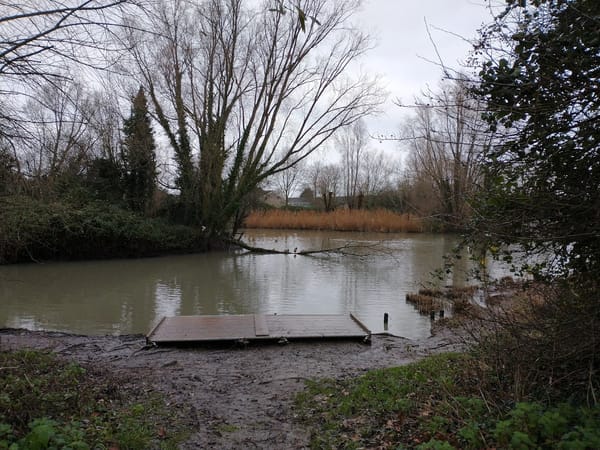Matters of the Heart
songwriting, backsliding

I'd love to be able to write songs. There's something about them. Perfect little packages of feeling. I'm not musically talented at all, so it's a skill I adore in other people; I love getting a new album and diving into the lyrics, line by line. Analysing them, but not in an academic way, more out of emotional curiosity. How did this person manage to convey this so beautifully? In so few words? And the answer is obviously not just the lyrics, but the music too.
I've written about Aurora before. She is a family favourite, but that's mainly driven by our daughter. She loves Aurora's sensitivity, her seriousness, and her silliness. (How's that for alliteration?) I love Aurora because she gives absolutely no shits. When her album What Happened to the Heart? came out last year, we were all feeling pretty excited about it. At the time, I was in the midst of AI-induced fear and sadness; this album, along with Aurora's interviews about it, offered some relief. Some companionship in the worry. When you're watching something unfold that you've been screaming about for a long time and you can't do anything to stop it, it feels like a huge comfort when someone else says it too. This album is about humanity. About losing our way. In the companion book, she says: 'I wonder what happened to us? ... we're just sitting in the dark, thinking we're alone.'
And then, at the end of the very sincere letter that opens the book, she says this: 'I decided to write something good to myself. And also something good to the people who sat in the dark with me.'

'Good' is an understatement for this album, I think. It's also a bit of a misleading word. You could read her opening letter and feel apprehensive. You could be expecting the tone of Imagine (Pandemic Version), faux positivity designed to distract us from those big scary things going on in the outside world. What could this person, who by her own admission spends quite a large amount of time frolicking in her stunning homeland of Norway and writing songs all day, have to say about the pit a lot of us find ourselves rotting in? But What Happened to the Heart is as sharp as it is hopeful. She dives into that pit and drags the darkness back up with her for us all to observe. 'Soft hearts need protection,' she sings, on The Blade, 'But I've got sharp blades.' She's alternately fierce and vulnerable, whisper-quiet in some songs, near-screaming in others. The album feels alive. It's very human. Which, I suppose, is the point.
I keep thinking about the line in To Feel Alright: 'I don't want to fight. I long to feel alright.' Just before my deconstruction, we did a Bible study about fighting. In Christian publishing and music, there are themes and trends just like everywhere else. And the trend at the time was spiritual warfare. It was about powers and principalities. It was about prayer. It was about enemies among us. Just out of sight. But always plotting, always scheming, always targeting us, working away in the invisible realm. I came away from the study feeling exhausted and drained. At the same time, I watched relatives become obsessive about warfare in both religion and politics. A lot of talk about enemies in spirit and in flesh. I remember clearly feeling, as an exhausted mother of two young children balancing a lot of things: but what if I don't want to fight all the time? What if I just want to live my life? But that felt like backsliding, to me. Like I was checking out. And yes, maybe I was. Maybe I was just too tired to keep it going.
I long to feel alright. For the past two years, I think this is the one thing I have wanted more than anything else. Just to allow myself to be happy. Sometimes, I think I block myself from feeling alright on purpose. In a weird act of self-sabotage. But why?

I watched a documentary about stalking this morning. It put the shivers up me. I've found myself at home today, listening to the rain, slightly more alert than I usually would be. In the documentary, a scorned colleague turns into a monster at the flick of a light switch, and he blames her for the horror that unfolds afterwards: I can't believe you've been so cold to me, he says, before threatening to rape her in front of her boyfriend. This is familiar. I've known men like this. Who can change in the blink of an eye.
And I've talked about this before, but being vulnerable is something that I often ponder. I wonder if it's worth it. The best writing is the writing that creeps very close to the edge of being 'too much'. I have an internal sense of what is too personal and what isn't, but sometimes I'll do something like watch a documentary and it shifts a bit. I want to protect myself.
I think that's what I love about songwriters. They can be vulnerable but somehow make it feel universal, not just about themselves. I think about the impact certain musicians have had on me because they dared to lay themselves bare. When we met Jack Garratt recently, I nervously told him his music meant so much to me. What I meant to say was: your album Love, Death and Dancing is a perfect, beautiful encapsulation of someone having a mental breakdown and it has been so useful in both understanding other people and understanding myself, and you've made me feel so much less alone and afraid, and when I hear your songs my heart is genuinely lifted, even on the dark days. But that felt like a bit of a mouthful. Hopefully, he got the gist.
I keep writing these things because it helps me. I guess that outweighs the nervousness that comes with sharing personal stuff. In the stalking documentary, the stalker breaks into the house and steals the victim's journal. Once she realises this, she starts screaming; you get to see her distress on their Ring doorbell footage. He's got my journal, she screams, he's got my journal. She knows what it means. Luckily, he is caught before he can do anything with it. But in that moment, she recognises that he's been handed a weapon. A journal is a profoundly personal thing.
It made me pause before I sat down to write this morning. I would never share what I write in my journal, obviously. But I do get quite personal sometimes. I can tell when I'm writing honestly and when I'm putting up barriers. And I think other people can, too.

Back to Aurora. And backsliding. What Happened to the Heart? ponders when everyone became so hard and detached from each other. And there's a lot we could say about that. Technology plays a huge part. Religion and politics (entwined) play a huge part, too. The kind of Bible study I did back then was not explicitly Christian nationalist, although it was adjacent to it. It promoted a very individualistic, combative sort of faith, and it represented something I felt increasingly uncomfortable with. There was a paranoia to it. And I've met the extremes of that. I know people who speak of 'worldly' people (i.e., non-Christians) with a faint level of disgust.
And the thing is, not all Christians are like this. Most Christians I know are the ones who are plugged into their local church; they're more concerned with providing craft supplies for toddler groups or serving coffee on a Sunday morning than judging people, and the pastors are genuinely nice, level people and they want to be Christlike and serve their neighbours. There's no pretence. They're just people trying their best.
But technology has, to put it mildly, fucked people up. YouTube has been used as a tool for radicalisation. Now, people can stay at home and watch sermons that are more hateful than they are hopeful. The algorithm feeds the paranoia, the 'othering' of people outside of the bubble. The tidal wave of hateful content slowly and imperceptibly shifts their perspective; give people enough of this stuff and normal people look like demons in human form. You're being told that everyone on the other side hates you and everything you stand for. You're being told that you're being targeted, even if you're not. And then you're being rewarded for it. This is normal, hate preachers say, it's normal for them to hate us. It's a never-ending cycle of fear and belonging. It's like being in an abusive relationship. A hate preacher offers terror in one hand and comfort in the other. Suddenly, the local church, with its harvest festivals and regular old sermons about loving your neighbour, don't offer what they need anymore.
I probably don't need to tell you that this mentality essentially sums up modern political discourse on all sides. It is just as bad in the secular world as it is in the religious. You can consume an endless stream of hate if the algorithm decides it. Life is noisy, demanding, and tribal. It's tempting just to check out completely. I don't know how to be aware and not be exhausted. I don't know how to be knowledgeable without being afraid.

My favourite song on the album is Dreams, a quiet and beautiful melodic break after some of the heavier songs that precede it.
In my dreams
Everything's more quiet than here
In my dreams
Everything I feel disappears
In this song, she's where I often want to be: floating above everything, separate, in a quiet place where nothing can touch her. Not happy, exactly, but apart. Every time I hear this song, I want to cry. There's something about her voice on the word 'disappears'. It's so tender.
I messaged my sister-in-law the other day. We send each other voice notes. It's the easiest way to catch up when weeks have gone by without speaking to each other; too much to type on a text. I quite like getting voice messages from my loved ones. Someone once described it as 'listening to podcasts by my friends', and I think that sums it up.
'I'm hedgehogging,' I said to my sister-in-law. 'I'm curling up into a ball and I'm blocking everyone out because that's what I do when I'm feeling down.'
I am bluntly honest with her about this because I need to be. I jumped into September feeling hopeful. I had an arsenal of tools ready to combat winter sadness: CBT, antidepressants, exercise, vitamins, good food for my brain. I made a little mind map of autumn/winter plans and stuck it on my pinboard. I'm going to buy a SAD lamp. But in the back of my mind, there is fear needling away at me. What if I go back to where I was last autumn? What then? I can't go back there, not again.
In The Essence, Aurora sings:
It hurts so much
To be in touch
With the essence of us
It hurts so much
To be in touch
So, I'd rather not
When I'm at my worst, I withdraw. I disappear. It's a coping mechanism, I guess. For all the noise and stress. The difference, this time around, is that I can see myself doing it. And so here I am, writing. Not disappearing. Stubbornly here, whether anyone's listening or not; forcing myself to keep checking in both online and with my loved ones, forcing myself to keep my relationships alive. I'm not alone, here. I never was in the first place.
I numb myself because it's easier. I think that's why I stop myself from feeling happy sometimes. Because if I feel happy, I might also feel sad.

You could read this and be worried about me. You shouldn't be. I wrote recently about stubborn and determined healing, and I meant it. The old me would not have even admitted that I had a problem. I feel like a different person, now. I am much more secure in who I am. I am much more sure that the people I love will catch me. And so I am facing a bit of winter sadness, exacerbated by how horrible and uncaring the world feels at the moment, but I'm prepared for those feelings, and I know better than to run away from them. Nobody is going to fix me. I have to put the work in myself. And it's important to do this work not only for me, but for my family.
Working out a way of existing, now, without getting dragged into depression and despair, is a job in itself. Sometimes I feel whiplash; I'll be belting out '90s songs with Chris in the kitchen while our children roll their eyes at us, or I'll be snuggled up in bed with the kids watching Strictly after they've both drifted off to sleep, or I'll be awake stroking Ori after she's plonked herself on my chest in the night, and I'll feel this utter joy, and a sense of deep relief. I'm relieved to be here, I'm relieved to be alive and to be me and to have my loved ones with me. And then I'll go online or I'll watch the news, and it shifts. I'm acutely aware of how lucky I am. If I'm not careful, I'll start feeling guilty for ever struggling with my mental health in the first place, despite knowing full well that it doesn't work that way. What right do you have, to feel down? You're not an immigrant being sent off to Guantanamo. You're not a trans person being shouted at for using the wrong toilet. Get over yourself. There must be a way of being politically passionate and aware without harming yourself at the same time. I'm not sure how to do it, though. If anyone knows, please tell me.
What Happens to the Heart is an excellent album. It is the album of a person who feels things very deeply, who would rather give into her hedgehog tendencies and remove herself from everything, but who refuses to do so. This is a person who allows herself to feel absolutely everything, even to her own detriment. She writes from the heights and from the pit. There's ecstasy and despair in there. She wrote something to herself and to people sitting in the dark with her. It is a gift.





